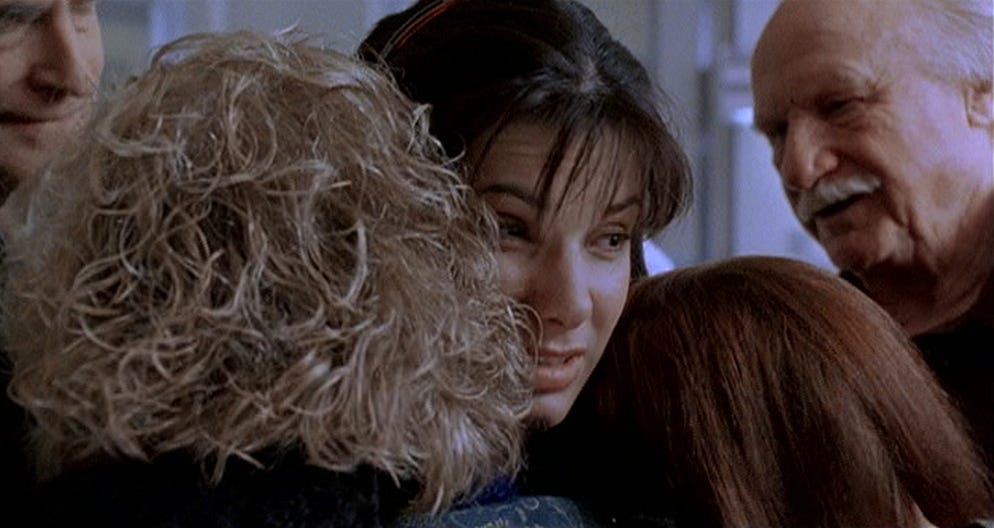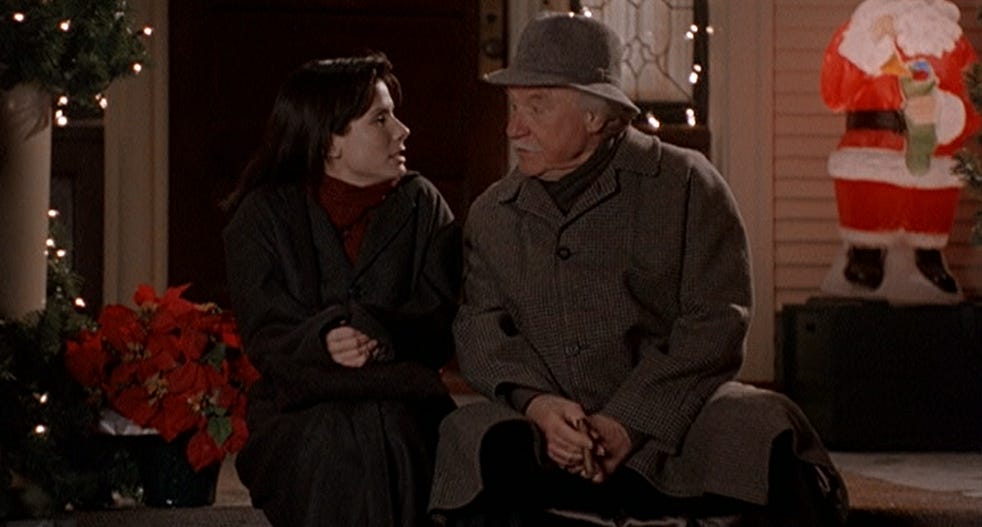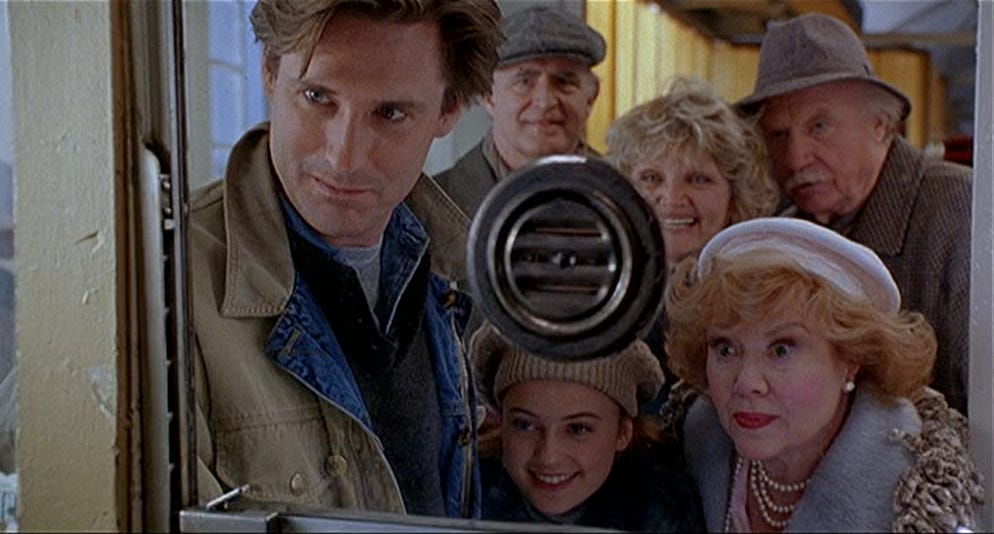Co-written: Ruth Buchanan and Lucy Crabtree.
I don’t remember the first time I watched While You Were Sleeping, but I do remember the most recent time. It was five minutes ago. For years, the 1995 film starring Sandra Bullock has been my go-to Christmas favorite. The narrative moves along at a good clip, the dialogue snaps, and the heartwarming conclusion never fails to give me the warm fuzzies.
I was only seventeen when the film released; and as I’ve matured, I’ve learned to appreciate it for more than just the laughter and the romance. I’ve increasingly come to respect how deeply While You Were Sleeping explores themes of singleness, loneliness, and the complex dynamics of human connections.
When we first meet Lucy Moderatz, she’s working in a toll booth for the Chicago Transit Authority. She’s isolated and lonely, spending all day trapped in a box, watching other people come and go, stuck while they move forward. In her off-hours, she fends off the advances of her landlord’s creepy son. Then she witnesses Peter Callaghan (played by the aptly named Peter Gallagher) fall on the tracks, saves his life, and gets all tangled up with his family.
After being mistakenly introduced as Peter’s fiancee, Lucy finds herself pulled into the Callaghan drama. The only person who knows the truth is the Callaghan’s widowed next-door neighbor and friend, Saul.
Saul isn’t related to the Callaghans—at least not by blood. But he’s Peter’s godfather and has known Peter since he was born, implying a long, ongoing relationship with the family. Ox helped Saul through his wife’s death, and the family took him in as their own. Saul is at the Callaghans’ for Christmas and in their pew for Mass. He’s not only Ox’s best friend: he’s family to all the Callaghans, and he takes his responsibility as a family member to heart. He’s been at every major event, the kind family shows up for. It’s not just that the Callaghans have taken pity on him and loved him but that he responds by bearing the glad burden of being part of the family.
Saul only learns the truth about Lucy and Peter in the first place because he went to the hospital on his own to visit his godson. He didn’t need to tag along with the whole family to visit; he had a strong enough bond with Peter—his best friend’s son—to want to see him in the middle of the night.
Later, when he does visit an alert Peter with the rest of the family around, he dismisses them so he can speak to Peter alone. No one resists or questions the request. Saul’s the godfather, after all. He encourages Peter to get to know Lucy and guides her through the charming chaos that is the Callaghan clan. Yes, he’s playing matchmaker. But not in the way you might think.
When he tells Lucy that he knows the truth about her relationship with Peter, he urges her to stick around for the family’s sake. “They need you, Lucy,” he tells her. “Just like you need them.” One wonders if he’s not also defining for her his own relationship with the Callaghans. He needs them, sure. But they need him, too.
As a teenager first watching the film, I thought While You Were Sleeping was a love story. Because I equated love with romance, I’d pigeonholed it as a rom-com. The story does have a burst of romance, but that’s only one aspect of love on display.
This is a love story in the fullest sense possible, the kind that encompasses not only romance but friendship, family, belonging. In Lucy’s loneliness, we recognize a truth that resonates deeply in our souls: we are not meant to be alone. In this year of pandemic lockdown and increased isolation, it’s a reality many of us have confronted in fresh ways.
As a widower who attests that he would be lost without the Callaghan family, Saul is best positioned to understand Lucy’s situation and recognize what she really needs. He comes alongside, befriends her, and fosters her connection to a community of people who will care for her.
She goes “from being all alone to being a fiancee, a daughter, a granddaughter, a sister, and a friend.”
She’s family.
When I look for myself in this story, I see myself more in Lucy than in Saul. Lucy gladly receives what the Callaghans have to offer—a stocking on the mantel, dinner, hand-me-down furniture—but she does so only at their invitation.
Throughout the film, Lucy doesn’t seek out what she needs as much as she responds positively to others’ overtures. This is me. I do my best to say “yes” to my married friends—as much as one can say “yes” in a pandemic, anyway—but that’s about it.
I know I can’t stay at this level forever, always receiving (however gladly) but never giving. Never proactively connecting people to each other and fostering ties that bind. How do I move from being a Lucy to a Saul? How do I journey from the outside to the inside, from waiting for an invitation to assuming I belong, from serving as a smiling observer of the family chaos to becoming a contributing member?
Honestly, I don’t know. But it seems a mindset shift may be in order. And not just for me, either. For all of us.
I’ve long assumed that I’m the needy one. That I need my married friends more than they need me. That without them, I’m the one who loses. Then came my most recent viewing of While You Were Sleeping. Saul challenges this assumption, casting a vision for a future in which single adult friends are a valued—and needed—part of the family.
But I can’t make this shift alone.
It will take all of us together.
As two single women in our 30s and 40s, we’ve both experienced quite a bit of good in this area, as families around us (blood or otherwise) have folded us in and loved us well. We want to acknowledge, honor, and thank them.
We also want to share a few principles we’ve seen that have made good experiences better.
Invitations. Make them less general and more specific. “Come over any time!” feels more like a sentiment than an invitation. “Come for dinner and games every Friday at 6:00pm” is specific, immediately actionable, and welcome.
Involvement. It’s one thing to be invited to functions. It’s another to be an active participant in the planning and execution. We can be more than a +1.
Interdependence. As While You Were Sleeping so aptly demonstrates, we all need one another. Let’s help foster connections that will empower people to bond, take care of one another, and bear each other’s burdens.
Ruth here. I want to take a second to thank Lucy Crabtree for formulating this essay’s thesis and for writing it with me. Make sure to show her some love!
Also, I want to thank you.
Thanks for spending another year reading my words, engaging with the ideas, asking great questions, pushing back where necessary, and just generally keeping the conversation going. A reminder that you can always share these posts with others you think would like them; and if you’re a subscriber, any time you hit reply and respond via e-mail, you can reach me directly.
I look forward to hearing from you!
I do plan to send out one more essay before 2021, but if I’ve taken anything to heart this year, it’s been the full force of Proverbs 16:9 - I can make my plans, but God will ultimately direct my steps.
If you don’t hear from me before then, I hope you have a wonderful Advent, a very Merry Christmas, and a Happy New Year!
You still have time to order copies of my newest release The Cross in the Culture before Christmas.









